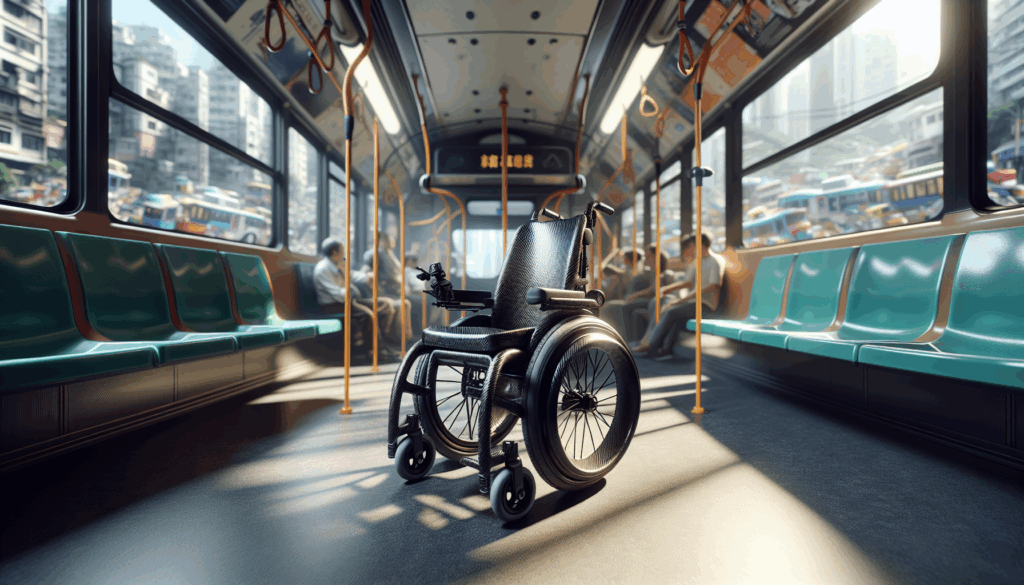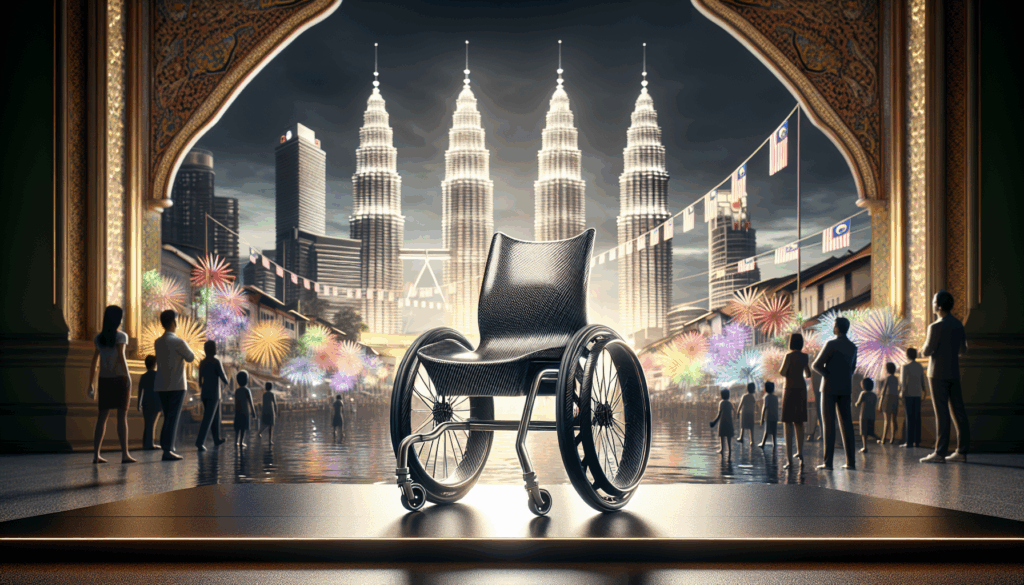
In the world of mobility solutions, electric wheelchairs have revolutionized independence for many individuals, but not all electric wheelchairs are created equal. The introduction of carbon fibre technology into electric wheelchair design not only enhances aesthetics but fundamentally improves the strength and durability of the frame. This lightweight yet robust material is becoming a game-changer, providing essential support while ensuring that users can navigate their environments with confidence and ease. In this blog, we will explore how carbon fibre transforms electric wheelchairs into durable mobility solutions, offering both functionality and style that empower users to lead active lives.
Understanding Carbon Fibre: Properties and Benefits
Carbon fibre is a revolutionary material known for its exceptional strength-to-weight ratio, making it an ideal choice for the construction of electric wheelchairs. In particular, the Edegree EW3 Carbon Fibre Electric Wheelchair exemplifies how this material enhances durability without compromising mobility. Weighing only 12.5kg, this electric wheelchair can support a maximum load of 160kg, showcasing its robust nature while ensuring ease of use for the user.
The aerospace-grade carbon fibre structure not only adds a sleek aesthetic but also provides the rigidity and resilience required in everyday mobility solutions, allowing users to navigate various terrains with confidence. The benefits of carbon fibre extend beyond lightweight construction; its resistance to corrosion and fatigue leads to a longer lifespan for electric wheelchairs.
In the Edegree EW3, this translates to a reliable performance with a dual motor and five-speed modes, ensuring that users can confidently traverse inclines of less than 10 degrees. With a battery capacity that allows for a range of 12-13 km on a single charge, the integration of carbon fibre elevates the functionality and reliability of electric wheelchairs, making them not just a luxury but a necessary advancement in modern mobility solutions. The marriage of technology with robust materials like carbon fibre is redefining the standards for electric wheelchairs.
Lightweight Design: How Carbon Fibre Enhances Portability
When selecting an electric wheelchair, the frame material plays a crucial role in determining its performance and longevity. Carbon fibre, renowned for its outstanding strength-to-weight ratio, is transforming the design of modern mobility aids. The Edegree EW3 Carbon Fibre Electric Wheelchair embodies this innovation with a frame that weighs just 12.5kg, including the battery. Despite its light weight, it delivers exceptional strength, supporting loads of up to 160kg. This makes the wheelchair not only durable but also efficient and easy to maneuver across different terrains.
The carbon fibre frame ensures superior stability and durability, making it suitable for both everyday and demanding use. It resists wear and tear better than conventional materials, offering long-term reliability. With a climbing ability of less than 10 degrees and a top speed of 8km/h, the Edegree EW3 is built to perform in varied environments. Its aerospace-grade construction adds to its resilience, while user comfort and safety remain top priorities. Additionally, the inclusion of Bluetooth-enabled joystick controls adds a layer of convenience, allowing users greater control and accessibility. Altogether, the use of carbon fibre in the Edegree EW3 marks a significant advancement in wheelchair engineering—enhancing mobility and independence for users everywhere.
Strength and Durability: The Structural Advantage of Carbon Fibre
The use of carbon fibre in the construction of electric wheelchairs, such as the Edegree EW3, highlights a revolution in durability and strength for mobility devices. Carbon fibre is known for its remarkable strength-to-weight ratio, making it an ideal material for the frame of electric wheelchairs. The aerospace-grade carbon fibre used in the Edegree EW3 not only provides a solid and sturdy structure that can support a maximum load of up to 160kg but also significantly reduces the overall weight of the chair to just 12.5kg.
This combination of lightness and strength allows users to enjoy enhanced mobility and ease of transport without sacrificing safety or stability. Furthermore, this advanced material contributes to the wheelchair’s sleek and modern design, showcasing that functionality can blend seamlessly with aesthetics.
The Edegree EW3: A Case Study in Carbon Fibre Electric Wheelchair Design
The Edegree EW3 Carbon Fibre Electric Wheelchair exemplifies the advantages of using carbon fibre in design and functionality. Weighing just 12.5 kg, this wheelchair provides a robust and lightweight structure, making it incredibly easy to transport without sacrificing durability or comfort. The aerospace-grade carbon fibre frame enhances the overall strength of the wheelchair, allowing it to comfortably support a maximum load of 160 kg.
With a dual motor system providing 24V 250W of power, the Edegree EW3 can navigate a range of terrains while maintaining a forward speed of up to 8 km/h and a climbing ability on inclines under 10 degrees. This combination of advanced materials and engineering sets a new standard for electric wheelchairs, transforming them into reliable mobility solutions. Furthermore, the Edegree EW3 is designed for user convenience with features like a lithium battery that offers a range of 12-13 km per charge, ensuring you can enjoy a day out without frequent recharging.
The battery charges in an impressive 6-8 hours, allowing quick turnarounds for mobility needs. With its Bluetooth remote-joystick and five-speed gear options, users can effortlessly navigate their environments. This case study of the Edegree EW3 establishes how carbon fibre elevates electric wheelchairs from simple mobility devices to strong, efficient, and accessible transportation solutions for users seeking independence and reliability in their daily lives.
Enhanced Mobility: The Impact of Carbon Fibre on Electric Wheelchair Performance

Carbon fibre has revolutionized the design and performance of electric wheelchairs, transforming them into robust and lightweight mobility solutions. One remarkable example is the Edegree EW3 Carbon Fibre Electric Wheelchair, which boasts a weight of only 12.5kg, including the battery. This significant reduction in weight does not compromise structural integrity; rather, the aerospace-grade carbon fibre used in its construction ensures that the frame remains both strong and durable.
The wheelchair supports a maximum load of 160kg, demonstrating its capability to accommodate a wide range of users while maintaining optimal performance. With a dual motor setup and a climbing ability of less than 10 degrees, this wheelchair offers users enhanced mobility, allowing them to navigate various terrains with ease and confidence.
Furthermore, the combination of carbon fibre’s lightweight nature and the Edegree EW3’s powerful lithium battery enables users to travel a range of 12-13 km on a single charge. The wheelchair also features a top speed of 8 km/h, providing a perfect balance between speed and stability. Moreover, the inclusion of a Bluetooth remote-joystick allows for easy maneuvering, enhancing overall user experience. By integrating carbon fibre into electric wheelchair design, manufacturers like Edegree are not only advancing technology but also improving the quality of life for users, encouraging independence and mobility beyond what was previously possible.
User Comfort and Safety: The Role of Carbon Fibre in Stabilizing Electric Wheelchairs
User comfort and safety are paramount when it comes to electric wheelchairs, and carbon fibre plays a crucial role in achieving both. The Edegree EW3 Electric Wheelchair, constructed with aerospace-grade carbon fibre, provides a lightweight yet sturdy frame that enhances stability during operation. This material’s remarkable strength-to-weight ratio not only ensures durability but also enables smoother mobility, which is essential for users navigating various terrains. With a maximum load capacity of 160kg, users can feel secure knowing that the wheelchair can support their weight without compromising structural integrity or comfort.
The Future of Electric Wheelchairs: Trends and Innovations in Lightweight Materials
As technology advances, the electric wheelchair industry is witnessing a remarkable shift toward lightweight materials that offer both durability and enhanced user experience. Carbon fibre stands out as a game-changing option, providing not only a reduction in weight but also an increase in strength and stiffness compared to traditional materials. The Edegree EW3 Carbon Fibre Electric Wheelchair exemplifies this trend with its aerospace-grade carbon fibre frame, which makes it incredibly lightweight at just 12.5 kg—making mobility more accessible for users.
This innovation ensures improved portability, allowing users to travel without the burden of heavy equipment, as well as an impressive max load capacity of 160 kg that caters to a wider range of individuals. With features like dual brushless motors and an efficient lithium battery, the EW3 demonstrates how premium materials enhance performance and sustainability in electric mobility solutions. Furthermore, as manufacturers continue to explore carbon fibre for electric wheelchairs, we can expect innovations that enhance user interaction and customization.
For instance, the Edegree EW3 includes a Bluetooth remote-joystick, allowing for an intuitive control experience while maintaining the sleek design that carbon fibre promotes. This integration of technology, such as our ability to track speed, charge status, and other performance metrics, will become standard as we look towards the future of electric wheelchairs. Such advancements ensure that users not only receive a practical mobility solution, but also one that reflects modern aesthetics and technology, making electric wheelchairs a more appealing option for users of all ages.
Embracing the Future with Carbon Fibre Electric Wheelchairs

In conclusion, the integration of carbon fiber into electric wheelchairs, such as the Edegree EW3, showcases a remarkable blend of durability and lightweight design. Weighing only 12.5kg yet capable of supporting up to 160kg, the carbon fiber frame significantly enhances the overall structure and stability of the wheelchair, providing users with a reliable mobility solution. This advanced material not only empowers the electric wheelchair with superior strength but also facilitates ease of handling and transport, making mobility more accessible to individuals in need.
Furthermore, the impressive specifications of the Edegree EW3, including its 12-13km range per charge and dual motor capabilities, exemplify how modern technology can redefine personal mobility. With features like a Bluetooth remote and a versatile speed mode, users can navigate their environments with confidence and convenience. Embracing carbon fiber technology in electric wheelchairs is undoubtedly a step towards a future where mobility solutions are not just functional but also a testament to engineering excellence and user empowerment.
